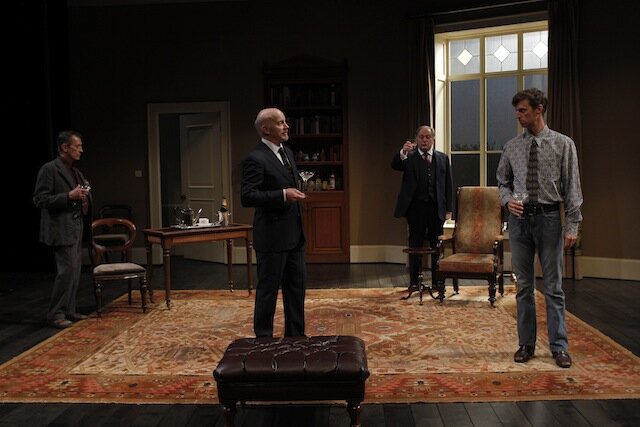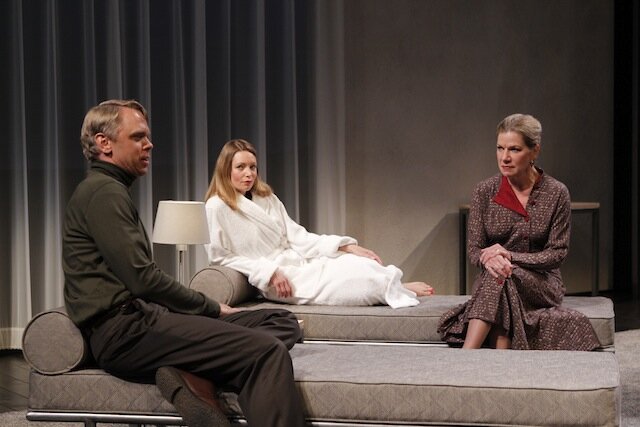
This week at ACT’s Harold Pinter Festival, a pair of plays revel in the wordplay and humor Pinter used to adulterate the frustration in his works, and reveal the power of the made-up to reflect reality’s complexities back to us, in an unexpected carom. You’ve heard of the fog of war, well, there’s also a fog of Pinter. No telling if you’ll emerge it from it.
“Does It Make Sense? Who Cares? It’s a Pinter Play” is the New York Times headline for a review of a production of No Man’s Land, which is more antagonistic to the notion of realism than Old Times, the slightly more accessible one. No Man’s Land is the kind of show that so defeats the sense-maker in our heads that it can abruptly give up on the project of consciousness, leaving chins sinking chestward in the audience.
You’re parachuted into a wealthy writer’s study as Hirst (a masterful Frank Corrado, moving and looking like a drink-stunned English bulldog) and his guest Spooner (Randy Moore, whose rumpled suit ends delightfully in Birkenstocks) have a late-night chat–more of a Spooner soliloquy, actually, as Hirst gulps down drinks at an alarming rate.
To synopsize more risks misleading you, as you’d likely try to construct a plot out of Hirst’s collapse, the appearance of his watchful, enabling servants Foster (Benjamin Harris) and Briggs (Peter Crook), and Spooner’s increasingly desperate attempt to “get on” with Hirst in some capacity, whether altruistic or self-serving.
You might also want to fasten onto the helpfully explicated “No Man’s Land,” described in the play in these words: “Which never moves, which never changes, which never grows older, but which remains forever icy and silent.”
But before we get to all that, it’s worth making it clear that Pinter isn’t interested in having you suspend your disbelief, so much as in thwarting belief in much at all. These characters, like Beckett’s, exist in their own space–but that’s about all that can be said about their innate understanding of it. Pinter, inverting the arc toward a character’s self-knowledge, takes a nagging ambiguity to extremity. In performance, that leads to an improvisational relationship between the actors (which is not to short the thoughtful direction here, by Penny Cherns).
When Foster bursts in on Spooner, a few minutes pass before Spooner responds to any of his repeated questions–it’s as if Spooner is deciding whether to engage with this new performer, there on the spot. When Hirst claims to recognize Spooner, and attempts to humiliate him, Spooner parries with an unlikely shared history neither has previously mentioned. But having started it, Hirst has to play along (until he can’t stand it anymore)–to get hung up on who is who is to miss the viciousness beneath the reminiscence. What the scene is about is what is happening just then, not history.
Time and setting leach into these scenarios, but don’t structure them. At a remove from post-War Britain and a bloodier referent for No Man’s Land, the play now can feel more like a dystopic Jungian arena, with ego and alter-ego, and shadow personalities, than an exploration of social status and the twin hindrances of dissipation and envy. (For a contrasting but related fable, there’s Bergman’s Hour of the Wolf from 1968.)
It’s a boozily alcoholic evening where personality becomes porous, and the stranger across the table seems somehow familiar, and vice versa: “I have known this before,” intones Moore’s Spooner, poetically portentous, getting laughs. A play like this has a Rorschach effect; today, the disordered mind, the hyperlinked states of arousal, the irruption of memory and fantasy, could call up a Boomer’s fear of dementia, and the dissipation of a self in desperate need of a secretary to make sense of things. It’s equally disquieting.

Old Times, fittingly, is the older play of two, from 1971. Unreliable memory abounds here as well, along with an unhealthy dollop of ’70s sexism. A self-possessed couple, Kate (a sphinxy Cheyenne Casebier) and Deeley (Jeffrey Frace, brimming with boyish self-confidence), are waiting in their country home for the arrival of Anna (Anne Allgood), who roomed with Kate when they were two single girls in London. About all that Deeley can get out of Kate on the subject is that Anna used to wear her underwear. In a Pinter play, this will naturally go to a few different places.
In 2012, what might strike you most forcefully is how Pinter could stage all the elements of a lesbian crush but not feel the need to name it; there are improper things that can be named, and even worse things that can’t, because of the contamination inherent in even understanding what that is. (You can hear it in William Buckley’s sputtering “Now, listen you queer!” in his 1968 debate with Gore Vidal–in his anger, he forgets himself and his social class and says the word in public.) Deeley won’t forget himself in that way, though he will get angry and abusive, and needle Anna (who gives as good as she gets).
Once again, the play is the container, not chronological time–in Old Times, Pinter makes this explicit (well, for Pinter) by fashioning a dramatic ouroboros where memory becomes prologue. (It’s a Modernist spin on unity of time.) And again, history becomes a question of who can tell the most damaging or compelling story: Literalists want to know, really, who killed who, but Pinter is not one to bicker and argue…about that, at least.
His psychological realism jostles aside dramatic convention: Can you pull Kate and Anna and their history apart, the people they were then and the people they are now? As in No Man’s Land, an alter-ego can also be a person–that’s the nature of relationship. A shy girl can have a sexually adventurous friend, but it’s also true that any given person can seem split into two if you look selectively enough.
In Old Times, both of these things are true successively–he brings to light our incompatible interpretive stances, encourages them. While initially Deeley and Anna via for Kate’s interest (in a battling song lyrics segment), Pinter doubles down with Deeley’s need to annex Kate’s life previous to their marriage. If Anna is that unknown land, he’ll invent–yes, yes, he remembers now–having planted a flag there, no man’s land or not.
In No Man’s Land, Spooner has an idea for a painting. It’s based on when he was in Amsterdam, at a café, and was watching people enjoy the afternoon while another café customer whistled. He’d paint all that was going on in front of him, and call the painting “The Whistler”–even though no one would likely understand the reference (you can’t hear a whistle in a painting).
I associate this with the unusual emotional resonance to Pinter’s theatrical portraits–they are his whistling through the dark spaces to life: crippling ennui, jealousy, disintegration. Does any of that make sense?